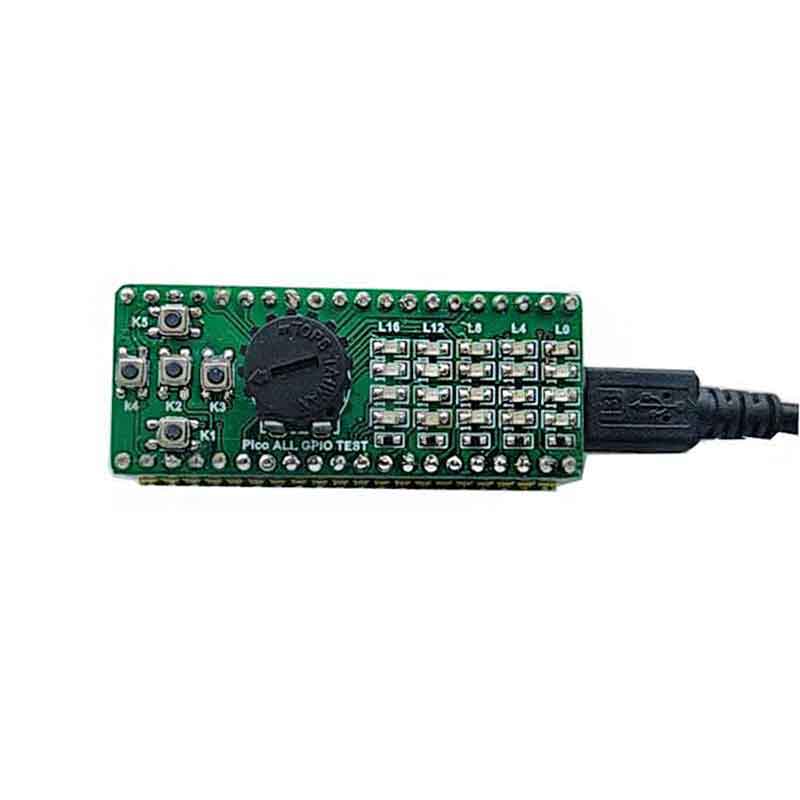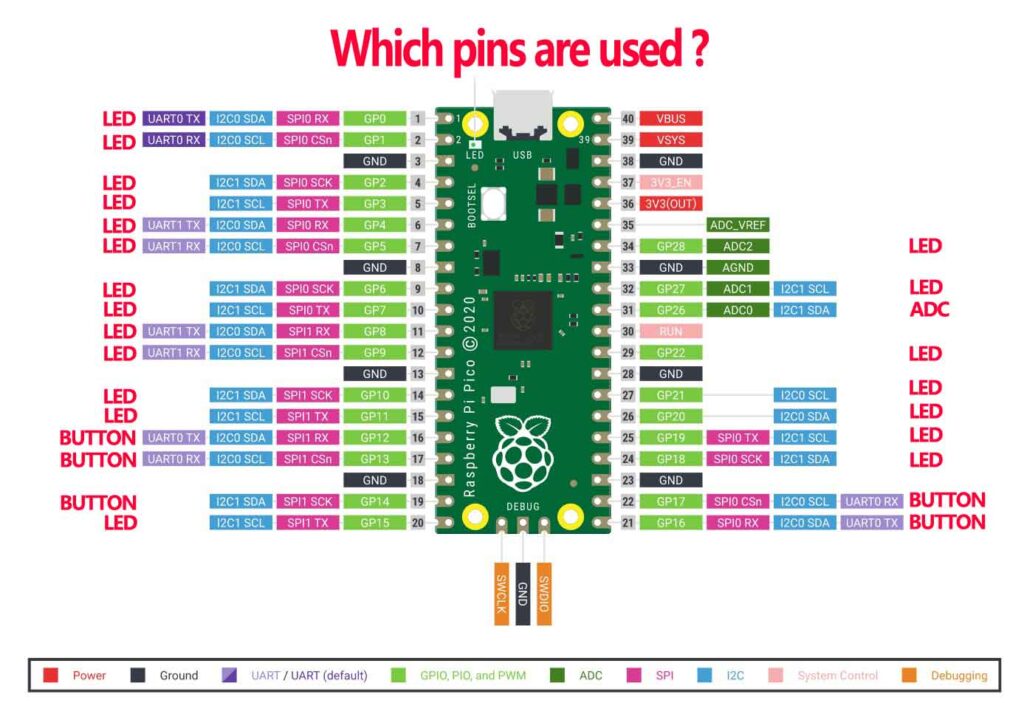In this article we look at an expansion board for the Raspberry Pi Pico which is designed to test all of the GPIO pins.
You can see this pictured below, the board contains 5 push buttons, 1 potentiometer and 20 leds connected to various GPIO pins

Here is an image of the pins that this board uses

This board has a couple of possible use cases
- As a demo board , test whether the GPIO pins of Pico are working
- As an expansion board, this module includes LED, button, ADC basic function.
Purchase
The board only costs about $2
Code
There are a couple of code examples that I could find
This is the button test example, press a button and an LED will light
[codesyntax lang=”python”]
from machine import Pin
import time
led = Pin(15, Pin.OUT)
button = Pin(12, Pin.IN, Pin.PULL_UP)
button1 = Pin(13, Pin.IN, Pin.PULL_UP)
button2 = Pin(14, Pin.IN, Pin.PULL_UP)
button3 = Pin(16, Pin.IN, Pin.PULL_UP)
button4 = Pin(17, Pin.IN, Pin.PULL_UP)
while True:
if button.value() & button1.value() & button2.value() & button3.value() & button4.value() :
led.low()
time.sleep(0.5)
elif button.value() | button1.value() | button2.value() | button3.value() | button4.value() :
led.high()
time.sleep(0.5)
[/codesyntax]
This is an led test example, the LEDs will flash in sequence
[codesyntax lang=”python”]
from machine import Pin
import time
led=[28,27,1,0,22,21,3,2,20,19,5,4,15,18,7,6,11,10,9,8];
Pin(led[0], Pin.OUT)
Pin(led[1], Pin.OUT)
Pin(led[2], Pin.OUT)
Pin(led[3], Pin.OUT)
Pin(led[4], Pin.OUT)
Pin(led[5], Pin.OUT)
Pin(led[6], Pin.OUT)
Pin(led[7], Pin.OUT)
Pin(led[8], Pin.OUT)
Pin(led[9], Pin.OUT)
Pin(led[10], Pin.OUT)
Pin(led[11], Pin.OUT)
Pin(led[12], Pin.OUT)
Pin(led[13], Pin.OUT)
Pin(led[14], Pin.OUT)
Pin(led[15], Pin.OUT)
Pin(led[16], Pin.OUT)
Pin(led[17], Pin.OUT)
Pin(led[18], Pin.OUT)
Pin(led[19], Pin.OUT)
while 1:
for i in range(len(led)):
j=Pin(led[i], Pin.OUT)
Pin(led[0], Pin.OUT).low()
Pin(led[1], Pin.OUT).low()
Pin(led[2], Pin.OUT).low()
Pin(led[3], Pin.OUT).low()
Pin(led[4], Pin.OUT).low()
Pin(led[5], Pin.OUT).low()
Pin(led[6], Pin.OUT).low()
Pin(led[7], Pin.OUT).low()
Pin(led[8], Pin.OUT).low()
Pin(led[9], Pin.OUT).low()
Pin(led[10], Pin.OUT).low()
Pin(led[11], Pin.OUT).low()
Pin(led[12], Pin.OUT).low()
Pin(led[13], Pin.OUT).low()
Pin(led[14], Pin.OUT).low()
Pin(led[15], Pin.OUT).low()
Pin(led[16], Pin.OUT).low()
Pin(led[17], Pin.OUT).low()
Pin(led[18], Pin.OUT).low()
Pin(led[19], Pin.OUT).low()
time.sleep(0.1)
j.high()
time.sleep(0.1)
[/codesyntax]
